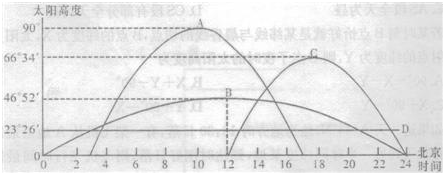下列A、B、C、D四条曲线表示不同纬度在6月22日的太阳高度日变化,读图回答以下问题。(12分)

(1)根据图中信息判断:A,B,C,D四地中,此日有太阳直射现象的是,能观察到极昼现象的有和,正午影子半年朝北,半年朝南的是。(4分)
(2)A、B、C、D四地,按纬度由高到低排列为。春分日正午太阳高度角由大到小排列为。(2分)
(3)A地经纬度是;B地所在国是 _ ;D地东半年看北极星的仰角是。(3分)
(4)一架飞机从B地飞往C地,飞行方向是方向,为了保持飞机飞行高度始终在平流层下部,机长应在飞行过程中将飞行高度逐渐(上升、下降),原因是。(3分)
(1)A(1分) B(1分) D(1分) C(1分)
(2)DBAC(1分)CABD(1分)
(3)23~26°N,150~E(1分)俄罗斯(1分)90。(1分)
(4)西南(1分) 上升(1分)纬度越低,对流层厚度越大(1分)
(1)根据6月22日A,B,C,D四地太阳高度日变化可以判断,A为北回归线,B为北极圈,C为赤道,D为北极点。有太阳直射现象的是A,能观察到极昼现象的是B和D;正午影子半年朝北,半年朝南的是C。
(2)根据上题信息,A、B、C、D四地,纬度由高到低排列为DBAC;春分日太阳直射赤道,正午太阳高度角由大到小排列为CABD。
(3)根据6月22日太阳高度角最大为90°、太阳高度最大时北京时间为10时,A地经纬度为23°26′N,150°E;同样思路可以判断B地经纬度为66°34′N,120°E,该国家为俄罗斯;D地东半年看北极星的仰角是90°(北极星的仰角就是当地的纬度)。
(4)对流层在低纬高度为17—18千米;中纬高度为12-13千米;高纬高度只有8-9千米。一架飞机从B地飞往C地,飞行方向是西南方向(根据地理坐标,北半球向右偏),为了保持飞机飞行高度始终在平流层下部,机长应在飞行过程中将飞行高度逐渐上升,原因是纬度越低,对流层厚度越大。
